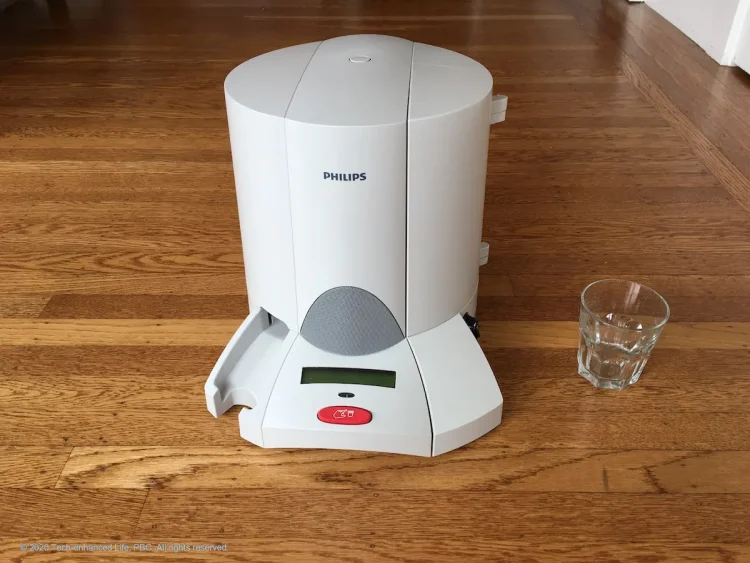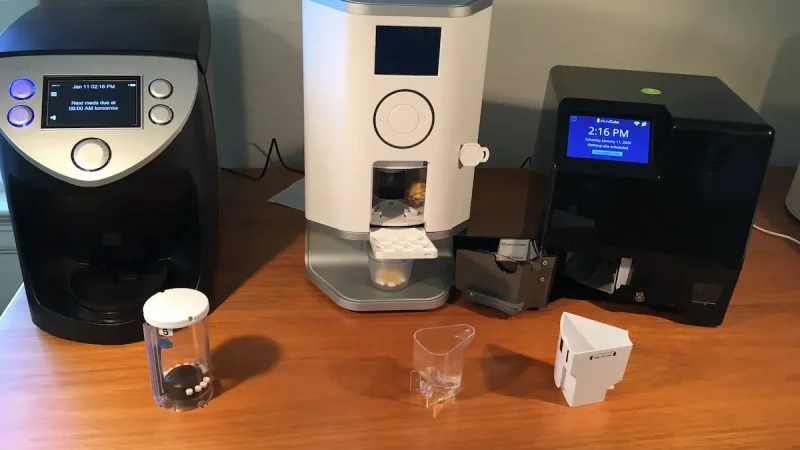Automatic Medication Dispensers for the Elderly: A Comprehensive Guide

As the global population ages, there is an increasing need for solutions that help elderly individuals manage their health and medication more effectively. One such innovation is the automatic medication dispenser, a device designed to improve medication adherence, reduce errors, and provide greater independence to seniors. These devices have become increasingly popular in recent years due to their ability to simplify the often-complex process of taking multiple medications. In this article, we will explore the importance of medication management for the elderly, the role of automatic dispensers, their benefits, and considerations for choosing the right device.
The Challenge of Medication Management for the Elderly
As people age, they often develop multiple chronic conditions that require ongoing medication management. According to the National Institute on Aging, more than 80% of older adults have at least one chronic condition, and many take multiple medications daily to manage these conditions. For some, this can mean juggling several medications with different schedules and dosages. Medication errors, such as taking the wrong dose or forgetting to take a pill, are common, and they can lead to serious health complications, hospitalizations, or even death.
The complexities of managing medications become even more pronounced when seniors live alone or have cognitive impairments such as dementia or Alzheimer’s disease. Forgetfulness, confusion, and difficulty following prescribed medication regimens can exacerbate the issue. Studies have shown that non-adherence to medication is a significant concern for elderly individuals, leading to poorer health outcomes and increased healthcare costs.
Thus, there is an urgent need for solutions that can help seniors take their medications accurately and consistently. Automatic medication dispensers are designed to address this challenge by providing an easy-to-use, reliable way to manage medications for seniors.
What Is an Automatic Medication Dispenser?
An automatic medication dispenser is a device that automatically dispenses the correct dose of medication at the right time. These devices can be used for various medications, including pills, capsules, and sometimes liquids. Most dispensers are programmable and can store multiple doses of medication, allowing caregivers or family members to load the device with several days’ worth of medications in advance.
Automatic dispensers come in a range of models, from simple pill boxes with alarms to more sophisticated systems that are capable of managing complex medication regimens for seniors with multiple prescriptions. Many devices feature advanced technologies, such as reminders, alerts, and even remote monitoring by caregivers, which enhance their functionality and reliability.
Types of Automatic Medication Dispensers
There are several types of automatic medication dispensers available, each catering to different needs and preferences. Here are some of the most common types:
1. Basic Automatic Pill Dispensers
These are the simplest type of dispensers, which typically feature a compartment for each dose of medication. The device may be programmed to release a dose at specific times during the day. Basic models may include alarms or flashing lights as reminders to take the medication. These devices are particularly useful for seniors who need help remembering to take their medications at scheduled times.
2. Smart Medication Dispensers
Smart dispensers go a step further by incorporating digital features. They may connect to mobile apps or home automation systems, allowing caregivers to monitor medication adherence in real time. Smart dispensers can alert caregivers if the elderly person misses a dose or takes the wrong medication. Some advanced smart dispensers even have built-in voice prompts that guide the user through the medication-taking process.
3. Medications Dispensing Systems with Pills and Liquid Compartments
Some automatic dispensers are designed to handle both pills and liquids, making them suitable for people who need to take both forms of medication. These systems usually come with multiple compartments that can be loaded with different types of medication. This option is ideal for seniors with complex medication schedules who require various forms of medication throughout the day.
4. Telehealth-Enabled Medication Dispensers
Telehealth-enabled dispensers are advanced systems that allow remote monitoring by healthcare providers. These devices can send alerts to physicians or caregivers if a patient has not taken their medication as prescribed. Additionally, telehealth systems may enable health professionals to adjust dosages remotely or communicate directly with the patient about their medication regimen.
Benefits of Automatic Medication Dispensers for the Elderly
Automatic medication dispensers offer a wide range of benefits for elderly individuals and their caregivers. These advantages make them invaluable tools for managing medications effectively and improving health outcomes for seniors.
1. Improved Medication Adherence
One of the most significant benefits of automatic medication dispensers is their ability to improve medication adherence. Many seniors struggle to remember whether they have taken their medications, especially when they have complex regimens. Automatic dispensers ensure that the right medication is taken at the correct time, minimizing the risk of missed or double doses. This can be especially beneficial for seniors with cognitive impairments such as Alzheimer’s or dementia, who may have difficulty remembering their medications.
2. Reduced Risk of Medication Errors
Medication errors can lead to serious health consequences, especially for seniors who are already dealing with multiple medical conditions. Automatic dispensers help reduce the risk of errors by organizing and dispensing the medications in the correct dosage and at the right time. By automating this process, the likelihood of mistakes, such as taking the wrong medication or the wrong dose, is significantly decreased.
3. Increased Independence for Seniors
Many seniors prefer to live independently, but managing medications can be a barrier to maintaining that independence. Automatic dispensers can give seniors greater autonomy in managing their health. By eliminating the need for constant assistance with medication management, seniors can take more control over their health and well-being, which can lead to an improved sense of confidence and dignity.
4. Peace of Mind for Caregivers
Caring for an elderly loved one can be stressful, especially when it comes to ensuring they take their medications correctly. Automatic dispensers can reduce the burden on family members and professional caregivers by automating the medication management process. These devices can alert caregivers if a dose has been missed or if there are any issues with the medication regimen, providing peace of mind that the senior is following their prescribed treatment plan.
5. Convenience and Ease of Use
Automatic medication dispensers are designed to be user-friendly and convenient. Many devices are simple to set up and operate, with easy-to-read displays, alarms, and clear instructions. Some models are portable, allowing seniors to take their medications on the go. The automation of medication dispensing also saves time, as there is no need for seniors or caregivers to manually sort and organize medications.
Considerations When Choosing an Automatic Medication Dispenser
While automatic medication dispensers offer numerous benefits, it is important to choose the right device based on the individual needs of the elderly person. Below are some factors to consider when selecting a dispenser:
1. Medication Complexity
The complexity of the medication regimen should be a key consideration when choosing a dispenser. If the elderly person takes several medications throughout the day with different schedules, a more advanced dispenser with multiple compartments and scheduling capabilities will be necessary. On the other hand, a simpler model may be sufficient for someone who takes only one or two medications at regular intervals.
2. Ease of Use
It is crucial to choose a dispenser that is easy for the elderly person to operate. Devices with large buttons, clear displays, and intuitive interfaces are more suitable for seniors with limited dexterity or vision impairments. Devices with voice prompts or large visual indicators can also be beneficial.
3. Alerts and Notifications
Look for a medication dispenser with reliable alert systems. Alarms, flashing lights, or sounds can be used to remind the senior when it’s time to take their medication. Some devices also offer reminders via mobile apps or text messages, which can be particularly helpful for caregivers or family members who live at a distance.
4. Size and Portability
Depending on the elderly person’s lifestyle, the size and portability of the medication dispenser may be important. If the person travels frequently, a compact, portable device may be a better option. Larger, stationary units may be more appropriate for individuals who stay at home most of the time.
5. Cost and Insurance Coverage
Automatic medication dispensers can vary widely in price, depending on their features and complexity. While some basic models are relatively affordable, more advanced dispensers with smart technology or remote monitoring capabilities can be expensive. It’s important to check whether the device is covered by insurance, Medicare, or Medicaid. Many dispensers also offer subscription-based services, which should be factored into the cost consideration.
Conclusion
Automatic medication dispensers have become an essential tool in promoting medication adherence, safety, and independence for elderly individuals. These devices provide a practical solution to the challenges of managing multiple medications, reducing the risk of medication errors, and offering peace of mind to both seniors and their caregivers. As the elderly population continues to grow, automatic dispensers will play an increasingly vital role in the healthcare management of seniors, enhancing their quality of life and enabling them to live independently for longer.
Carefully considering the needs and preferences of the individual, as well as the features of the device, can help ensure the best possible outcome for medication management. Whether through increased convenience, reduced errors, or greater autonomy, automatic medication dispensers are a valuable innovation in elderly care that should not be overlooked





